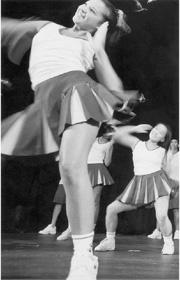SCARCELY ABLE TO contain his pride, moon-faced taxi driver Parvez chats up his disinterested passenger. “My son is getting married to Madelaine,” he announces in a booming voice. “Madelaine Fingerhut, the top policeman’s daughter!”
My Son the Fanatic
directed by Udayan Prasad
starring Om Puri, Rachel Griffiths
opens July 2 at Broadway Market
It’s as if Parvez, a Pakistani immigrant living in northern England, isn’t just gaining a daughter; he’s gaining acceptance into English society via his more assimilated son, Farid. Beautifully played by Om Puri, an actor who could very well be the Indian counterpart to Sir Anthony Hopkins, Parvez is one of the most richly drawn figures to be seen on film this year, at turns gaining our sympathy and scorn. In several scenes, he’s a target of subtle and not-so-subtle racism—but screenwriter Hanif Kureishi (The Buddha of Suburbia) refuses to let us feel sorry for him. Parvez is no martyr; he’s just a regular bloke with both flaws and merits, full of verve and conflict.
The son of an Indian father and British mother, Kureishi, 44, has been a leading chronicler of multicultural Britain for the past decade, mining the field of race relations with iconoclastic spunk. His scripts for My Beautiful Launderette (1985), Sammy and Rosie Get Laid (1987), and London Kills Me (1991) have evoked the youthful urban world of gay sex, punk rock, and drugs amidst the cultural remnants of a once-dominant empire.
My Son the Fanatic, directed by Udayan Prasad, is as unconventional as those films, though considerably more muted in its pop sensibilities. Based on one of Kureishi’s short stories, it is also the finest of his screenplays, rich with emotional texture and inhabited by wonderfully complex characters.
The story is a generation-and-culture-gap tale in reverse: Parvez, the elder in an immigrant family, turns out to be more liberal-minded than his British-born-and-bred son. While Parvez embraces Britain as his home even while Britain refuses to embrace him, Farid rejects English culture in a misguided attempt at upholding fundamentalist Islamic laws. Citing elusive concepts like “purity” and “belonging to the past,” Farid slaps Dad in the face by breaking off his engagement to the white girl and telling him that he refuses to bring up any children in England. “In the end, our cultures cannot mix,” the son intones grandiosely.
But mix they do. Stuck in a stale marriage, Parvez slowly rediscovers romance through a friendship with one of his regular passengers—a prostitute named Bettina (Rachel Griffiths). Griffiths, who turned in a quiet but stunning Oscar-nominated performance in Hilary and Jackie, is all brass and cheek here as a bottle blonde in heels. While her character is shallow in comparison to Parvez, Griffiths manages to bring subtlety and depth to the role. We first see her through a reflection in Parvez’s rear-view mirror as she’s being mauled by a drunk. Her face, dwarfed by a long wig, remains stone cold during her client’s exercise in self-gratification.
No doubt the characters in this movie will not appeal to everyone. In fact, as I was walking out of the theater, I overheard a young woman who was clearly offended by some of Parvez’s behavior—most notably, his acting as a pimp in one scene, arranging a party with prostitutes for a German businessman. But it’s that very mix of the noble and ignoble in Parvez that helps him elude facile judgment; and it’s that kind of ambiguity that gives this movie such a genuine and refreshing feel.






